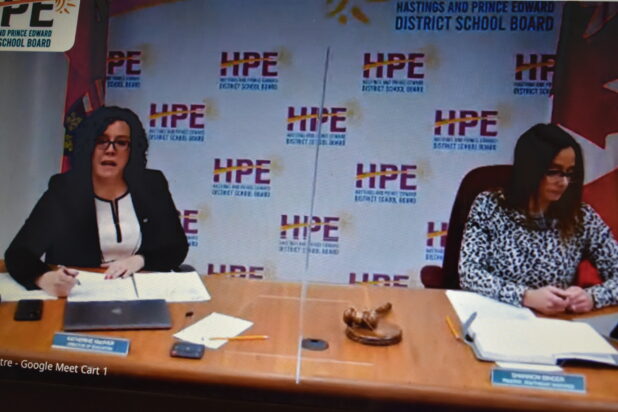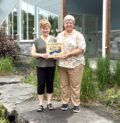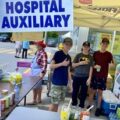Headline News
Schools will not be contact traced for COVID-19
January 12, 2022

By Kristena Schutt-Moore
The Hastings Prince Edward District School Board held their first meeting of 2022 on Jan. 3 to discuss the announcement from the province that schools would remain closed and remote/in-home learning would return until at least Jan. 17.
The update to the return to learning plan was given by the director of education Katherine MacIver. She said that when the meeting was originally called she thought she would be giving a much different report and she thanked the superintendents and system team leads who worked through the holidays to ensure that the plan was ready and up to date as changes were required. The report has been made public on the school board’s website www.hpedsb.on.ca.
Though schools are closed to the majority of classes, the after school child care that is held in some schools is still available to children already in the program, especially those whose parents work in the emergency services fields. Each school’s Early Year’s partners will be coordinating these programs. Another avenue that is still open for parents is that the special education or life skills learning programs will still be taught in schools in contained classrooms. However, parents are able to choose if their child in the program continues to study in school or in-home. Superintendent Kenneth Dostaler says that students in life skills classes do better in a class/school environment compared to in-mone learning, so he does recommend to parents to let their kids in the life skills program go to school if that option is possible.
Families that are in need of equipment such as ipads, laptops or mobile hotspot hubs for better internet services are asked to contact their local school or contact the school board directly. MacIver said that the school board would be working out solutions to get devices put into students’ hands.
Staff that continue to work in HPEDSB buildings will now have the option to wear a non-fit-tested N95 mask or continue to use the provided medical masks. Board employees worked over the holidays to get these new masks shipped to schools as soon as possible, and they were expected to arrive by Jan. 7. The school board is required to also share these masks with their child care partners that work with each of the schools. Three-layer cloth masks for students have also been ordered for students when in-school learning returns. These masks will be offered free of charge and will be used as spares for students who show up to school with masks that don’t fit properly or lose their mask and/or other concerns.
The school board was also able to order 30 HEPA units that will be used to help areas within schools with ventilation as required by public health. The school board already has 381 HEPA filter units in schools and additional 30 will be distributed according to facility priorities throughout all schools within the school board. Not all learning spaces will be receiving a HEPA unit, as schools have mechanical ventilation and MacIver says that when in-school learning returns there will be recommendations to increase ventilation in all classrooms.
The school board has also made a limited number of PCR tests to schools to be used by symptomatic students and staff. Each school is to receive an amount roughly equal to 10 per cent of their school population. This means, for example, that if a school has 100 students and staff, they will get roughly 10 tests. The tests will be made available when in-school learning resumes.
“There is a very small number of tests that are available,” explained MacIver. “And to the best of our knowledge right now is that when they run out, they will run out and we are not sure on replacements. We have been told that there will be more rapid antigen tests coming. The province is looking to procure these on our behalf and anticipated delivery may be from middle to end of the month. And with our move to remote learning we know there isnt the same urgency as there was 24 hours ago to receive some of these added protective devices. But it is still on our radar and information is being updated by public health and the Ministry of Education.”
The school board has been talking with service providers within their area to provide a booster vaccine clinic for staff, however it has yet to be approved. The hope is that if a clinic will be held it would make it easier for staff members to get their vaccines. The board did talk about holding a clinic for students and families, however there is no program for that at this time so no motion was made, but staff was asked to keep a look out for any possibility.
MacIver said that one of the most significant changes is about “public health will no longer provide contact tracing and notification of positive COVID-19 cases.” This means that if a positive case of COVID-19 is found in a school, public health will not be doing contact tracing, or notifying parents and guardians. MacIver believed that this change came from the workload on public health staff around contact tracing and notification.
This concerned the board as many trustees believed that families had the right to know, and they also worried about what responsibilities would be falling onto the shoulders of their staff. Administrators will fulfill legislative reporting responsibilities as required or as directed by the Ontario chief medical officer of health, which includes reporting any communicable disease to the local Medical Officer of Health. Staff also has the right to refuse entry into any school building to anyone that is known to have a communicable disease.
Board trustee Alison Kelly said, “They [public health] send me notices about chicken pox and lice in the school. I know how to and can deal with those. But COVID-19, why can’t they notify me and other parents about COVID-19?” This questions went unanswered. MacIver said that as all screening and notification processes and requirements evolve she will notify all staff and parents.
At the end of the meeting Trustee Lucile Kyle, Trustee Lisa Ann Chatten and Kelly all put forward a motion for letters to be sent to the government that better internet services need to be provided to rural communities as students are being left out. Chatten and Kelly also put a motion forward that class sizes be put back to 25 students or less as currently the indoor limit due to COVID-19 regulations is 25 people, and students do better in school in smaller class sizes, yet class sizes only continue to get larger.




















